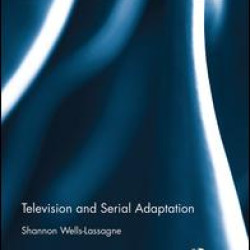Television Studies
Brand: Taylor & Francis
Model: Stock
The first in the Routledge Television Guidebooks series, Science Fiction TV offers an introduction to the versatile and evolving genre of science fiction television, combining historical overview with textual readings to analyze its development and ever-increasing popularity._x000D_
J. P. Telotte di..
₹1,761.83 ₹2,202.28
Brand: Taylor & Francis
Model: Stock
The first in the Routledge Television Guidebooks series, Science Fiction TV offers an introduction to the versatile and evolving genre of science fiction television, combining historical overview with textual readings to analyze its development and ever-increasing popularity._x005F_x000D_
J. P. Telo..
₹9,180.00 ₹11,475.00
Brand: Taylor & Francis
Model: Stock
First Published in 1992. Routledge is an imprint of Taylor & Francis, an informa company...
₹2,643.10 ₹3,303.88
Brand: Taylor & Francis
Model: Stock
In this volume, Nathanson looks at the issue of time and domesticity and argues that the media constructs panics about domestic time scarcity while at the same time offering solutions for those very panics. Analyzing TV programs such as How Clean is Your House, Up All Night, and Supernanny, she find..
₹2,569.66 ₹3,212.08
Brand: Taylor & Francis
Model: Stock
From remakes and reboots to transmedia storytelling, loose adaptations or adaptations which last but a single episode, the recycling of pre-existing narrative is a practice that is just as common in television as in film, and this text examines series from M*A*S*H to Game of Thrones, Pride and Preju..
₹8,812.80 ₹11,016.00
Brand: Taylor & Francis
Model: Stock
First Published in 1980. Routledge is an imprint of Taylor & Francis, an informa company...
₹2,643.10 ₹3,303.88
Brand: Taylor & Francis
Model: Stock
First Published in 1986. Routledge is an imprint of Taylor & Francis, an informa company...
₹2,643.10 ₹3,303.88
Brand: Taylor & Francis
Model: Stock
Television Brandcasting examines U. S. television’s utility as a medium for branded storytelling. It investigates the current and historical role that television content, promotion, and hybrids of the two have played in disseminating brand messaging and influencing consumer decision-making. Juxtapos..
₹9,180.00 ₹11,475.00
Brand: Taylor & Francis
Model: Stock
Television for Women is a timely intervention into the broader analysis of television across genre, across time, and from a range of international perspectives._x005F_x000D_
_x005F_x000D_
The book opens with a Preface from Charlotte Brunsdon, a leading figure in feminist television studies, followed..
₹2,716.54 ₹3,395.68
Brand: Taylor & Francis
Model: Stock
First Published in 1997. Routledge is an imprint of Taylor & Francis, an informa company...
₹2,643.10 ₹3,303.88
Brand: Taylor & Francis
Model: Stock
The antihero prevails in recent American drama television series. Characters such as mobster kingpin Tony Soprano (The Sopranos), meth cook and gangster-in-the-making Walter White (Breaking Bad) and serial killer Dexter Morgan (Dexter) are not morally good, so how do these television series make us ..
₹2,789.98 ₹3,487.48
Brand: Taylor & Francis
Model: Stock
This book fills a significant gap in the critical conversation on race in media by extending interrogations of racial colorblindness in American television to the industrial practices that shape what we see on screen. Specifically, it frames the practice of colorblind casting as a potent lens for ex..
₹2,789.98 ₹3,487.48













